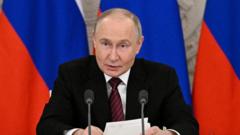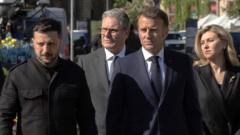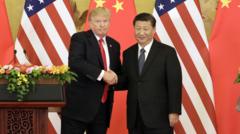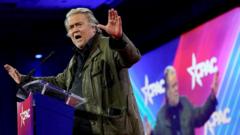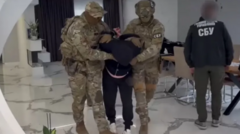In his recent comments, Klitschko emphasized that while such concessions could provide temporary peace, they would be impossible for the Ukrainian populace to accept in the face of ongoing conflict and territorial occupation.
Ukraine's Mayor Suggests Territorial Concessions Could Lead to Peace

Ukraine's Mayor Suggests Territorial Concessions Could Lead to Peace
Kyiv's Vitali Klitschko warns that Ukraine might need to consider relinquishing land to Russia for a potential peace settlement.
Kyiv Mayor Vitali Klitschko has openly addressed the possibility that Ukraine may need to concede land to Russia as part of a peace agreement. Speaking on BBC Radio 4’s Today programme, Klitschko remarked that giving up territory might be an undesirable, yet feasible option for achieving "temporary" peace. He highlighted the emotional difficulty of such a decision, stating that the Ukrainian people "will never accept occupation" by Russian forces.
This discussion comes on the heels of a devastating missile and drone attack in Kyiv that resulted in at least 12 fatalities and over 80 injuries, marking one of the most lethal assaults on the capital in recent months. Klitschko, who portrays himself as a defender of Kyiv—the heart of Ukraine—conveyed the weight of responsibility resting on officials like President Volodymyr Zelensky. He acknowledged that Zelensky may face "painful solutions" to broker peace with Russia.
While Klitschko and Zelensky are known political adversaries, with Klitschko criticizing the president for perceived undermining efforts, he refrained from speculating about the details of any ongoing negotiations. When directly asked, the mayor confirmed that he had not been privy to any discussions on a possible settlement, asserting, "President Zelensky does it himself. It's not my function."
Tensions are escalating as former President Donald Trump has pressured Ukraine to acknowledge potential territorial compromises, particularly regarding Crimea—annexed by Russia in 2014. Trump claimed that Crimea “was lost years ago” and should not be a key issue in negotiations. Contrarily, Zelensky steadfastly opposes recognizing Russian claims over the peninsula, citing an earlier declaration from Trump's administration that rejected the annexation.
As the situation develops, both Klitschko and Zelensky remain at the forefront of Ukraine's fight for sovereignty amid increasing external pressures, while concerns regarding Trump's stance towards Russia continue to loom over European discussions on the conflict.
This discussion comes on the heels of a devastating missile and drone attack in Kyiv that resulted in at least 12 fatalities and over 80 injuries, marking one of the most lethal assaults on the capital in recent months. Klitschko, who portrays himself as a defender of Kyiv—the heart of Ukraine—conveyed the weight of responsibility resting on officials like President Volodymyr Zelensky. He acknowledged that Zelensky may face "painful solutions" to broker peace with Russia.
While Klitschko and Zelensky are known political adversaries, with Klitschko criticizing the president for perceived undermining efforts, he refrained from speculating about the details of any ongoing negotiations. When directly asked, the mayor confirmed that he had not been privy to any discussions on a possible settlement, asserting, "President Zelensky does it himself. It's not my function."
Tensions are escalating as former President Donald Trump has pressured Ukraine to acknowledge potential territorial compromises, particularly regarding Crimea—annexed by Russia in 2014. Trump claimed that Crimea “was lost years ago” and should not be a key issue in negotiations. Contrarily, Zelensky steadfastly opposes recognizing Russian claims over the peninsula, citing an earlier declaration from Trump's administration that rejected the annexation.
As the situation develops, both Klitschko and Zelensky remain at the forefront of Ukraine's fight for sovereignty amid increasing external pressures, while concerns regarding Trump's stance towards Russia continue to loom over European discussions on the conflict.

